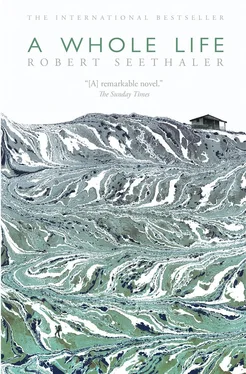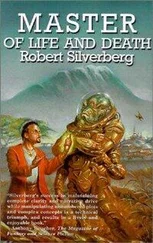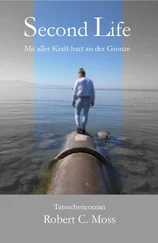Robert Seethaler - A Whole Life
Здесь есть возможность читать онлайн «Robert Seethaler - A Whole Life» весь текст электронной книги совершенно бесплатно (целиком полную версию без сокращений). В некоторых случаях можно слушать аудио, скачать через торрент в формате fb2 и присутствует краткое содержание. Год выпуска: 2015, Издательство: House of Anansi Press Inc, Жанр: Современная проза, на английском языке. Описание произведения, (предисловие) а так же отзывы посетителей доступны на портале библиотеки ЛибКат.
- Название:A Whole Life
- Автор:
- Издательство:House of Anansi Press Inc
- Жанр:
- Год:2015
- ISBN:нет данных
- Рейтинг книги:4 / 5. Голосов: 1
-
Избранное:Добавить в избранное
- Отзывы:
-
Ваша оценка:
- 80
- 1
- 2
- 3
- 4
- 5
A Whole Life: краткое содержание, описание и аннотация
Предлагаем к чтению аннотацию, описание, краткое содержание или предисловие (зависит от того, что написал сам автор книги «A Whole Life»). Если вы не нашли необходимую информацию о книге — напишите в комментариях, мы постараемся отыскать её.
Set in the mid-twentieth century and told with beauty and tenderness, his story is one of man's relationship with an ancient landscape, of the value of solitude, the arrival of the modern world, and above all, of the moments, great and small, that make us who we are.
A Whole Life — читать онлайн бесплатно полную книгу (весь текст) целиком
Ниже представлен текст книги, разбитый по страницам. Система сохранения места последней прочитанной страницы, позволяет с удобством читать онлайн бесплатно книгу «A Whole Life», без необходимости каждый раз заново искать на чём Вы остановились. Поставьте закладку, и сможете в любой момент перейти на страницу, на которой закончили чтение.
Интервал:
Закладка:
‘Then too. He’d still be Grollerer.’
‘And say it had ripped away both arms, both legs, and half his head?’
Egger considered. ‘He’d probably still be Grollerer, even then… somehow.’ Suddenly he was no longer quite so sure.
Thomas Mattl sighed. He placed the arm gently on the toolbox and together, with a couple of cuts of the spade, they dug a hole in the ground. In the meantime the forest had begun to breathe again and birds were singing over their heads. It had been a chilly day, but now the blanket of clouds dispersed and sunlight fell in shimmering bundles through the canopy of leaves, making the earth muddy and soft. They placed the arm in its little grave and shovelled it in. The fingers were last to disappear. For a moment they stuck up out of the earth like fat mealworms, then they were gone. Mattl pulled out his little pouch of tobacco and filled his pipe, which he had carved himself out of plum wood.
‘It’s a messy business, dying,’ he said. ‘As time goes on there’s just less and less of you. It happens quickly for some; for others it can drag on. Starting from birth you keep losing one thing after another: first a finger, then an arm, first a tooth, then a whole set of teeth, first one memory, then all your memory, and so on and so forth, until one day there’s nothing left. Then they chuck what’s left of you in a hole and shovel it in and that’s your lot.’
‘And there will be a cold,’ said Egger. ‘A cold that gnaws the soul.’ The old man looked at him. Then he twisted his mouth and spat just past the stem of his pipe at the treacherous splinter of pine, its edges sticky with Grollerer’s blood. ‘Rubbish. There won’t be anything, no cold and certainly no soul. Dead is dead and that’s that. There’s nothing after that — no God, either. Because if there were a God, his heavenly kingdom wouldn’t be so bloody far away!’
Thomas Mattl was taken from this world nine years later, almost to the day. All his life he had hoped he would die on the job, but it happened differently. While bathing in the only bathtub in the camp, a battered monstrosity of galvanized iron that one of the cooks rented out to the workers for a small sum, Thomas Mattl fell asleep. When he woke the water was icy, and he caught a cold from which he never recovered. For several nights he lay sweating on his pallet, babbling incoherently, about either his long-dead mother or ‘bloodsucking forest demons’. Then one morning he got up and declared that he was now well and wanted to go to work. He pulled on his trousers, stepped outside the door, craned his head towards the sun and fell down dead. He was buried next to the village cemetery, in the steeply sloping meadow the company had purchased from the local authority. Virtually all the employees who were able to gathered there to say goodbye, and listened to the short funeral address that one of the foremen had cobbled together, which talked about the hard work on the mountain and Mattl’s pure soul.
Thomas Mattl was one of an official total of thirty-seven men who died while working for Bittermann & Sons, up until the firm went bankrupt in 1946. In truth, however, many more gave their lives for the cable-car industry, which expanded ever faster from the 1930s on. ‘For every gondola someone goes underground,’ Mattl had said in one of his final nights. By then, though, the other men were no longer taking him all that seriously; they thought the fever had already burned the last vestiges of his wits from his brain.
And so Andreas Egger’s first year with Bittermann & Sons came to an end, and the 1st Wendenkogler Aerial Cable Car (this was its official title, though only the mayor and the tourists ever used it — the locals just called it Blue Liesl on account of its two lightning-blue cabins, which also, owing to their rather flat front sections, bore a certain resemblance to the mayor’s wife) was inaugurated in a big opening ceremony at the top station. A whole host of fashionable people from beyond the valley stood on the platform freezing in thin suits and even thinner dresses, and the priest shouted his blessing into the wind with his cassock flapping around his body like the dishevelled plumage of a jackdaw. Egger stood amid his colleagues, who had spread out across the mountain below the Giant’s Skull, and every time he saw the people clapping up there on the platform he threw his arms into the air and let out a cheer of enthusiasm. In his heart there was a curious sensation of expansiveness and pride. He felt that he was part of something big, something that far exceeded his own powers (including the power of his imagination), and which he thought he could see would spell progress, not just for life in the valley but also, somehow, for the whole of humankind. Ever since the test ride a few days earlier, when Blue Liesl had wobbled her way to the top, juddering cautiously but without major mishap, the mountains seemed to have forfeited something of their enduring might. And more cable cars would follow. The company had extended the contracts of almost all its workers and presented plans to build a total of fifteen aerial cable cars, including a hair-raising construction that proposed to transport passengers with rucksacks and skis in free-floating wooden chairs instead of carriages. Egger thought this a rather ridiculous idea, but he secretly admired the engineers who squeezed such fantastical things out of their heads, and for whom neither snowstorms nor the heat of summer could cloud either their optimism or the shine on their immaculately polished shoes.
* * *
Half a lifetime or almost four decades later, in the summer of 1972, Egger stood on the same spot watching the shining silver gondolas of what was once Blue Liesl glide swiftly along, high above his head, accompanied by an almost inaudible buzzing. Up on the platform the cabin doors opened with a drawn-out hiss and discharged a crowd of day-trippers who streamed off in all directions, dispersing like bright insects over the mountain. These people who clambered about so recklessly on the scree annoyed Egger. They seemed to be constantly searching for some sort of hidden miracle. He would have liked to plant himself in their way and give them a piece of his mind, but he didn’t really know what exactly he would reproach them for. Secretly — this much at least he could admit to himself — he envied them. He saw them jumping over the rocks in trainers and shorts, putting their children on their shoulders and smiling into their cameras, whereas he was an old man, good for nothing any more and glad still to be able to move about more or less upright. He had already been so long in the world: he had seen it change and seem to spin faster with every passing year, and he felt like a remnant from some long-buried time, a thorny weed still stretching up, for as long as it possibly could, towards the sun.
* * *
The weeks and months after the opening ceremony at the top station were the happiest of Andreas Egger’s life. He saw himself as a small but not unimportant cog in a gigantic machine called Progress, and sometimes, before falling asleep, he would picture himself sitting in the belly of this machine as it ploughed inexorably through forests and mountains, contributing, with the heat and sweat of his brow, to its ongoing advance. He had taken the words with the heat and sweat of his brow from a tattered magazine Marie had found under one of the benches in the inn, and from which she would sometimes read to him in the evenings. In addition to all kinds of ideas about urban fashion, gardening, the keeping of pets and general morality, the magazine also contained a story. It was about an impoverished Russian nobleman who drove his lover, a peasant’s daughter blessed with strange gifts, across half of Russia one winter to rescue her from persecution by some fanatically religious village elders, including her own father, and bring her to safety. The story ended tragically, but it contained a large number of so-called romantic scenes which Marie read out with an almost imperceptible tremor in her voice, and which evoked in Egger a strange mixture of disgust and fascination. He listened to the words coming out of Marie’s mouth and sensed a heat slowly spreading beneath his blanket which, it seemed to him, would soon fill the entire cabin. Whenever the impoverished nobleman and the peasant’s daughter dashed across the snow-covered steppe in their carriage, at their backs the clattering of horses and the furious cries of their pursuers, and the terrified girl threw herself into the count’s arms, brushing his cheek as she did so with the seam of a dress already dirty from the journey, Egger could stand it no longer. He would kick away his blanket and stare with inflamed eyes into the flickering gloom beneath the roof beams. Then Marie would place the magazine carefully under the bed and blow out the candle. ‘Come,’ she whispered in the darkness, and Egger obeyed.
Читать дальшеИнтервал:
Закладка:
Похожие книги на «A Whole Life»
Представляем Вашему вниманию похожие книги на «A Whole Life» списком для выбора. Мы отобрали схожую по названию и смыслу литературу в надежде предоставить читателям больше вариантов отыскать новые, интересные, ещё непрочитанные произведения.
Обсуждение, отзывы о книге «A Whole Life» и просто собственные мнения читателей. Оставьте ваши комментарии, напишите, что Вы думаете о произведении, его смысле или главных героях. Укажите что конкретно понравилось, а что нет, и почему Вы так считаете.











